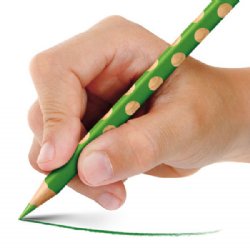Guest Post: Wendy, TinyEYE Occupational Therapist
Hello everyone!
I am excited to be able to share some of the typical challenges we see in fine motor development with you today. Fine motor skills are skills involving the small muscles in the hand. When a child has underdeveloped fine motor skills, you will notice a lack of control, dexterity and/or strength. He or she may have trouble stringing beads, drawing, writing, or turning pages. If left unresolved, children with fine motor development delays may struggle with basic life skills such as buttoning, zipping, tying shoes and using utensils, as well as skills necessary for school such as writing, turning pages, and typing.

 When a school-age child grasps a pencil or scissors, it is with a precise movement of the first three fingers, while stabilizing the scissors with the fourth and fifth fingers.
When a school-age child grasps a pencil or scissors, it is with a precise movement of the first three fingers, while stabilizing the scissors with the fourth and fifth fingers.
Snipping with scissors is a great way to help children develop the precise movements of the first three fingers while stabilizing the fourth and fifth fingers. Other ideas are lacing activities, tearing paper, and stringing beads on pipe cleaners.
Fingers are some of the densest areas of nerve endings on the body. They are the richest source of tactile feedback, and have the greatest positioning capacity of the body. If you notice a delay in fine motor coordination skills in your student or child, speak up! Early intervention is one of the best ways to address motor skill challenges, as the child’s habits are not yet formed by repetition.



